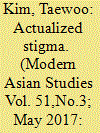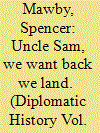| Srl | Item |
| 1 |
ID:
153580


|
|
|
|
|
| Summary/Abstract |
During the Open Port period and Japanese colonial period (1876–1945), Koreans generally had a positive image of the United States. This positive view of the United States held by Koreans persisted until after liberation from Japanese colonial rule in 1945. The United States was a ‘liberator’ that saved the Koreans, and was viewed as ‘a cooperator’ with whom Korea was to solve its national task of establishing a new country. However, the concept of ‘American imperialist warmonger’ had begun to be promoted in North Korea from 1948–49. It was a concept advanced by the Soviet Union and the North Korean leadership. The negative image of the United States, which spread throughout North Korea from the early years of the Cold War, was merely a perplexing stigma lacking substantiated grounds. However, the experiences of the Korean War actualized the image of the United States as a ‘warmonger’ in the hearts of the North Korean people. Alleged indiscriminate aerial bombings, mass slaughters, sexual assaults, and arson attacks against Korean civilians became the most important reason for the expansion of intense sentiment. Anti-Americanism began to be systemized and routinized in every aspect of North Korean life after the Korean War.
|
|
|
|
|
|
|
|
|
|
|
|
|
|
|
|
| 2 |
ID:
121162


|
|
|
|
|
| Publication |
2012.
|
| Summary/Abstract |
The American acquisition of military and naval facilities at Chaguaramas in Trinidad during World War II led to a significant Anglo-American controversy during the late 1950s. In 1957 the Chief Minister of Trinidad, Eric Williams, began a campaign to eject the Americans from the base. Members of the Eisenhower administration regarded the campaign as evidence of anti-Americanism and the US Navy sought to undermine Williams by cooperating with his opponents. This interference was resented by British policy-makers who were planning to grant independence to Trinidad as part of a West Indian federation. The resulting Anglo-American disagreement continued until a compromise, which allowed the United States to retain the base in return for economic aid, was reached in 1961. The episode is significant in demonstrating that Washington was concerned about incipient anti-Americanism within the Anglophone Caribbean and in signifying British determination to defend their remaining colonial interests after the Suez crisis.
|
|
|
|
|
|
|
|
|
|
|
|
|
|
|
|